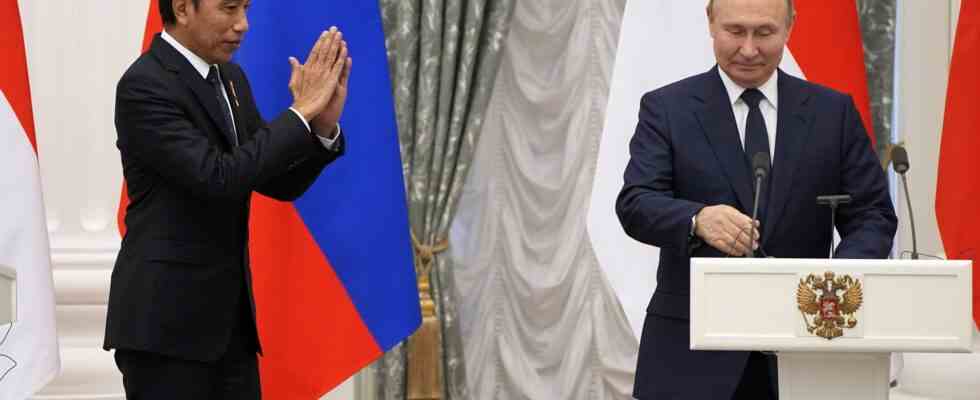world mirror
Status: 08/21/2022 09:39 a.m
Russia has maintained close ties with Indonesia for decades. After major investments and image campaigns, the country is popular: Many believe Kremlin narratives, express sympathy for Putin – and justify it with their own history.
“I love Putin. He’s very smart, charismatic and very strong,” says Pande admiringly. The 42-year-old sits in the classroom of a Russian language school in Bali. The Russian President is popular in Indonesia, especially among Indonesian youth.
Many pro-Russian videos are circulating on social media. They appeal to the tastes of the Indonesian population, show Putin with cute dogs, as a dutiful husband or as a powerful military chief.
The other six students in Pande’s class share his opinion. In their everyday life on Bali, they drive taxis, sell real estate, and guide tourists around the island. Every day you deal with many Russians who work or vacation in Bali.
Why Putin impresses the Indonesians
Jennifer Johnston, ARD Singapore, weltspiegel, August 21, 2022
Russia has done a lot for its image
Moscow and Jakarta have maintained close ties for decades. As early as the 1950s, the Soviet Union supported international recognition of Indonesian independence, explains Reynaldo de Archellie. He teaches Russian studies at the country’s largest state university. “The relationship between the two countries is close and has continued to grow, especially since the 2000s.”
Russia invests in railway lines, refineries, imports palm oil, coffee and rubber. There is also cooperation at the educational level. For example, de Archellie and his students receive scholarships to study in Russia.
In the capital Jakarta, Russia is financing a Russian cultural center where, among other things, language and cooking courses are offered. The state-funded website “Russia Beyond” disseminates pro-Russian news in the local language.
Almost three decades after the Chechen wars, Russia even managed to create an Islam-friendly image in Indonesia. “Under Putin’s leadership, Islam has become part of Russia. Russia’s national identity now also includes Islam,” says de Archellie. A very important sympathy point: Indonesia is the country with the world’s largest Muslim population.
An interpretation that catches the eye: the war in Ukraine is also seen in Indonesia as resistance to Western dominance, says Budiman Sudjatmiko.
Image: Jennifer Johnston/ARD Studio Singapore
Skeptical about the US
The image of the USA in the country is different. While Indonesians like the western lifestyle and are outspoken supporters of democracy, many perceive US foreign policy as expansionist.
Wars in predominantly Muslim countries such as Afghanistan, Iraq and Libya have fueled dislike for years. “Regarding the war between Russia and Ukraine, Russia is seen as the only country that has the courage to oppose Western expansion plans,” says Budiman Sudjatmiko, a member of the ruling party and a long-time member of the Indonesian parliament.
He reports that on a daily basis he overhears conversations from people who worry that “the West is targeting Ukraine.” Many people in Indonesia could understand that Russia feels threatened and feel sympathy.
“Indonesians lean towards anyone who can fight against Western dominance,” adds Sudjatmiko. This attitude is also due to their own colonial history.
Foreign policy neutrality – but not completely
At a high diplomatic level, the Indonesian government has been pursuing a foreign policy of neutrality for years and does not want to side with it. President Joko Widodo presents himself as a mediator: he recently visited Kyiv and then traveled on to Moscow.
However, Budiman Sudjatmiko emphasizes that Indonesia is not completely neutral. The President clearly rejected the invasion. “However, we are against sanctions. They are not proportionate. We must not isolate Russia. The impact on energy and food supplies can be enormous. We do not want to pour gasoline on a fire that is already burning.”
It’s already apparent, says Sudyatmiko, that the sanctions hurt the countries that imposed them more. A statement reminiscent of Russian storytelling.
Putin video excited
There is a break at the language school in Bali. Schoolgirl Dida holds out her mobile phone. On the screen is a video that almost everyone in Indonesia knows: it shows Putin during one of his speeches on Victory Day on May 9th. At the end he shouts “Hooray!” courageously and long drawn out. Thousands of soldiers answer the battle cry.
This arouses great admiration among the students. A few days ago, you yourself celebrated your Independence Day with big parades.
The participants in the Russian course hope that their language skills will help them in their job – they bring sympathy for Russia with them.
Image: Jennifer Johnston/ARD Studio Singapore
“All countries should have such armies,” says student Okjen. “When I see the video, I feel patriotism, leadership, heroism. Any country that has ever been attacked or colonized like we Indonesians will feel.”
In Indonesia, Russian propaganda falls on fertile ground.
You can see this and other reports in Weltspiegel – on Sunday at 6.30 p.m. in the first

